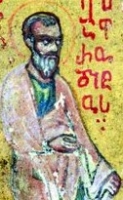
| 22 March |
• yesterday • tomorrow |

• John Owen
• Little John
25 October as one of the Forty Martyrs of England and Wales
Son of a carpenter, Nicholas was raised in a family dedicated to the persecuted Church, and became a capenter and mason. Two of his brothers became priests, another a printer of underground Catholic books, and Nicholas used his building skills to save the lives of priests and help the Church‘s covert work in England.
Nicholas worked with Saint Edmund Campion, sometimes using the pseudonym John Owen; his short stature led to the nickname Little John. When Father Edmund was martyred, Nicholas spoke out against the atrocity. For his trouble, he was imprisoned.
Father Henry Garnet, Superior of English Jesuits, employed Nicholas to construct hiding places and escape routes in the various mansions used as priest-centers throughout England. By day he worked at the mansion on regular wood- and stone-working jobs at the mansions so that no one would question his presence; by night he worked alone, digging tunnels, creating hidden passages and rooms in the house. Some of his rooms were large enough to hold cramped, secretive prayer services, but most were a way for single clerics to escape the priest-hunters. As there were no records of his work, there is no way of knowing how many of these hiding places he built, or how many hundreds of priests he saved. The anti-Catholic authorities eventually learned that the hiding places existed, but had no idea who was doing the work, or how many there were.
Due to the work, the danger, and the periodic arrests of the Jesuits, Nicholas never had a formal novitiate, but he did receive instruction, and in 1577 became a Jesuit Brother. On 23 April 1594 he was arrested in London and lodged in the Tower of London for his association with Father John Gerard. Not knowing who they had, the authorities released Nicholas soon after, and he resumed his work.
On 5 November 1605, Brother Nicholas and three other Jesuits were forced to hide in Hinlip Hall, a structure with at least 13 of his hiding places, to escape the priest-hunters. Owen spent four days in one of his secret rooms, but having no food or water, he finally surrendered and was taken to a London prison. There he was endlessly tortured for information on the underground network of priests and their hiding. He was abused so violently that on 1 March 1606, while suspended from a wall, chained by his wrists, with weights on his ankles, his stomach split open, spilling his intestines to the floor; he survived for hours before dying from the wound. Because he was under orders not to kill Nicholas, the torturer spread the lie that Owen had committed suicide. Martyr.
16th century Oxford, England
tortured to death on 2 March 1606 in London, England
25 October 1970 by Pope Paul VI
https://catholicsaints.info/saint-nicholas-owen/
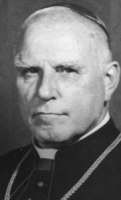
Lion of Münster
Born to one of the oldest German noble families. Ordained on 28 May 1904 at Münster, Germany. Chosen bishop of Münster on 5 September 1933. Fiercely anti-Communist, and an outspoken opponent of the Stalinist regime. A strong nationalist who loved his homeland, his was known for his opposition to the Nazis, their programs and policies. He was a key opponent in the fight to end the Nazi program of “euthanasia“, the murder of the old, the crippled, the ill. Created Cardinal-Priest of San Bernardo alle Terme on 18 February 1946.
16 March 1878 at Dinklage Castle, Lower Saxony, Germany
• 22 March 1946 at Münster, North Rhine-Westphalia, Germany of natural causes
• interred in the cathedral of Münster
• 9 October 2005 by Pope Benedict XVI
• recognition celebrated by Cardinal Saraiva Martins at Saint Peter's Basilica, Rome, Italy
• the beatification miracle involved Hendrikus Nahak, a 16-year old Indonesian whose life was threatened by a particularly dangerous form of appendicitis in 1995 who was healed after his nurse called on Cardinal von Galen to intercede on the boy‘s behalf
nec laudibus, nec timore (neither praise nor fear) - Blessed Clemens' motto for his ministry
https://catholicsaints.info/blessed-clemens-august-von-galen/
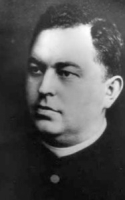
Bronislao
Son of Jan Komorowski and Katarzyna née Gencza who had eleven children between them. Priest in the archdiocese of Gdansk, Poland, ordained in 1914. Parish priest in Legowo, Poland, and then at the church of Saint Nicolaus in Gdansk. Taught history and and the Polish language in the city. Helped found the Towarzystwo Budowy Kosciolw Polskich (Association of Construction of Polish Churches) in 1923 as a way to increase participation by Poles in an area dominated by German priests. Deeply involved in the politics of his day, he served as a member of the Gdansk city council, ran for national office, and was opposed by the area Socialists for his defense of Polish identity for the Poles in the city. On 1 September 1939, the day Nazi Germany invaded Poland, Father Bronislaw and other priests were arrested, beaten and sent to a series of concentration camps. Executed for being actively Catholic. The night before his execution, he secretly celebrated Holy Thursday Mass with some other prisoners. Martyr.
25 May 1889 in Barlozno, Pomorskie, Poland
• shot on Good Friday 22 March 1940 in a field outside the Stutthof concentration camp near Sztutowo, Pomorskie, Poland
• in 1946 he and others in the mass grave were exhumed and re-buried in a cemetery in the Gdansk district of Zaspa, Poland
13 June 1999 by Pope John Paul II
https://catholicsaints.info/blessed-bronislaw-komorowski/

• Epaphroditus of Philippi
• Epaphroditus the Apostle
• Epaphroditus of Adriate
• Epafrodito...
First bishop of Terracina, Italy in the 1st century. May have been one of the Seventy Apostles, and the Epaphroditus mentioned by Saint Paul the Apostle in the Epistle to the Philippians.
With regard to Epaphroditus, my brother and co-worker and fellow soldier, your messenger and minister in my need, I consider it necessary to send him to you. For he has been longing for all of you and was distressed because you heard that he was ill. He was indeed ill, close to death; but God had mercy on him, not just on him but also on me, so that I might not have sorrow upon sorrow. I send him therefore with the greater eagerness, so that, on seeing him, you may rejoice again, and I may have less anxiety. Welcome him then in the Lord with all joy and hold such people in esteem, because for the sake of the work of Christ he came close to death, risking his life to make up for those services to me that you could not perform. - Philippians 2:25-30, New American Bible
https://catholicsaints.info/saint-epaphroditus-of-terracina/
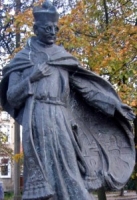
Son of Tomas and Petronela Górecki. Joined the army at age 17 fight in the Polish-Bolshevik war. Following his service, he entered the seminary, graduating with honors, and being ordained on 1 July 1928. Curate in Leszno, Poland. Prefect of the seminary in Kozmin and Wolsztyn. Assigned in 1933 to work with the Polish community in Gdansk, Poland, serving as chaplain to several organizations. On 1 September 1939, the day Nazi Germany invaded Poland, Father Bronislaw and other priests were arrested, beaten and sent to a series of concentration camps. Executed for being actively Catholic. Martyr.
21 May 1903 in Poznan, Wielkopolskie, Poland
• shot on Good Friday 22 March 1940 in a field outside the Stutthof concentration camp near Sztutowo, Pomorskie, Poland
• in 1946 he and others in the mass grave were exhumed and re-buried in a cemetery in the Gdansk district of Zaspa, Poland
13 June 1999 by Pope John Paul II
https://catholicsaints.info/blessed-marian-gorecki/
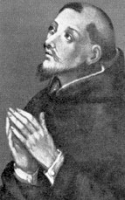
• Hugolinus of Cortona
• Hugolinus Zephyrini
• Hugolino, Ugolino
Civil strife forced Hugolinus' family to flee Cortona for Mantua, Italy while the Hugolinus was still a baby. He became a page of the court of the Gonzagas, but he did not care for court life and felt a call to religious life. Joined the Augustinians at the monastery of Saint Agnes in 1336. Priest. He returned to Cortona in 1354. Hermit, devoted to prayer and contemplation.
c.1320 in Cortona, Arezzo, Italy
• c.1367 of natural causes
• relics enshrined in the church of San Agostino in Cortona, Italy
1804 by Pope Pius VII (cultus confirmed)
Cortona, Italy (chosen by the citizeins in 1508)
https://catholicsaints.info/blessed-hugolinus-zefferini/
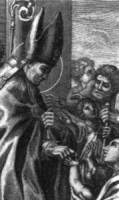
• Benevenuto of Ancona
• Beneventus, Benevenutus, Benvenuto, Benwenut
Studied law at Bologna, Italy, a student with Saint Sylvester Gozzolini. Archdeacon in Ancona, Italy. Franciscan. Chosen bishop of Osimo, Italy by Pope Urban IV, he served for 13 years during the Guelph and Ghibelline war. Knowing the date of his death, he gave away all his property to the poor just before passing on.
1188 in Ancona, Italy
• 22 March 1282 in Osimo, Italy of natural causes
• buried in the cathedral of Osimo
1284 by Pope Martin IV (cultus confirmation)
Osimo, Italy
https://catholicsaints.info/saint-benevenuto-scotivoli-of-osimo/
• Elbod of Gwynedd
• Elfodd, Elvodug, Elfoddw, Elbodus, Elbodius
Young monk at Holyhead monastery in Anglesey, Wales. He worked to align the calendar and practices of Welsh Christians with Rome as outlined in the synod of Whitby; documents from 768 record his direct involvement. Bishop of Bangor, Gwynedd, Wales. One of his spiritual students described him as a "most holy bishop" who closely studied the work of Saint Bede the Venerable.
mid-8th century Wales
809 of natural causes
https://catholicsaints.info/saint-elbod-of-bangor/
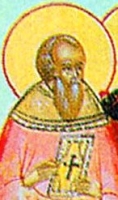
Priest in Ancyra, Galatia (in Asia Minor). Fought against the Arian heretics in the reign of emperor Constantius, and against the iconoclast heretics in the persecutions of Julian the Apostate. His defense of orthodox Christianity led to his imprisonment, torture and execution. Martyr.
mauled by wild beasts in 364 in the area at Caesarea, Palestine
https://catholicsaints.info/saint-basil-of-ancyra/
2 January as one of the Martyrs of Anjou
Priest in the diocese of Angers, France. Martyred in the persecutions of the French Revolution.
6 June 1752 in Marigné, Maine-et-Loire, France
martyred on 22 March 1794 at Angers, Maine-et-Loire, France
19 February 1984 by Pope John Paul II at Rome, Italy
https://catholicsaints.info/blessed-francois-louis-chartier/
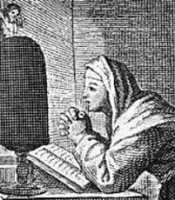
Born to the wealthy nobility, she lived and was married in Rome, Italy. Widow. She supported the house run by Saint Marcella, working as a menial servants, and later served as the group's superior. Known for her austere lifestyle and extreme penances. Saint Jerome wrote a panegyric in her honor.
384 of natural causes
widows
https://catholicsaints.info/saint-lea-of-rome/
Sister of Saint Patrick. Married to Conis. Mother of nineteen children, ten of whom became bishops; they include Saint Mel of Ardagh, Saint Sechnall, and Saint Rioc. Reported to have been a miracle worker, and to have the gift of prophecy. Her history is obscured by legend.
Valentia Island, Ireland
https://catholicsaints.info/saint-darerca/
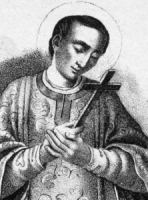
Octavius, Ottaviano
Archdeacon at Carthage, North Africa. Martyred with several thousand of his flock in the persecutions of the Arian Vandal King Hunneric.
martyred in 484 at Carthage, North Africa
https://catholicsaints.info/saint-octavian/
Callinicus
Wealthy woman in Galatia, Asia Minor (part of modern Turkey). Visited and comforted Christians imprisoned for their faith. Martyred for doing so.
martyred in 250 in Galatia, Asia Minor (part of modern Turkey)
https://catholicsaints.info/saint-callinica-of-galatia/
Soldier in the army of Alaric. Captured at the Battle of Vouillé and taken to Paris, France. When released he became a monk in Poitou, France, and then a hermit in the area of Perigord and Ruffec.
518 of natural causes
https://catholicsaints.info/saint-avitus-of-perigord/
Daughter of Count Arland. Sister of Saint Belindis. Nun. Helped found an abbey in Belgium, and served as its first abbess. Corresponded for many years with Saint Boniface and Saint Willibrord of Echternach.
745 of natural causes
https://catholicsaints.info/saint-harlindis-of-arland/
Wealthy woman in Galatia, Asia Minor (part of modern Turkey). Visited and comforted Christians imprisoned for their faith. Martyred for doing so.
martyred in 250 in Galatia, Asia Minor (part of modern Turkey)
https://catholicsaints.info/saint-basilissa-of-galatia/
Third century priest, ordained in Rome, Italy. Missionary to Gaul. Very successful in Narbonne, France.
• c.250 of natural causes
• buried on the Via Domitia outside Narbonne, France
https://catholicsaints.info/saint-paul-of-narbonne/
Trienan of Killelga
Fifth century spiritual student of Saint Patrick. Missionary Abbot of the monastery in Killelga, Ireland.
https://catholicsaints.info/saint-trien-of-killelga/
Martyred with nine Christian companions whose names have not come down to us.
martyred in northwest Africa
https://catholicsaints.info/saint-saturninus-the-martyr/
Deghitghi, Degithea, Geghia
Listed on several early Irish calendars and martyrologies, but no information about her has survived.
https://catholicsaints.info/saint-deghitche/
Brother of Saint Finan of Rath. Monk and abbot Iona Abbey.
in Ireland
c.680
https://catholicsaints.info/saint-failbhe-of-iona/
• Our Lady of Sorrows of Castelpetroso
• Our Lady of the Seven Veils
• Antonio Cocq
• Antonio Rubino
CatholicSaints.Info Portable Edition